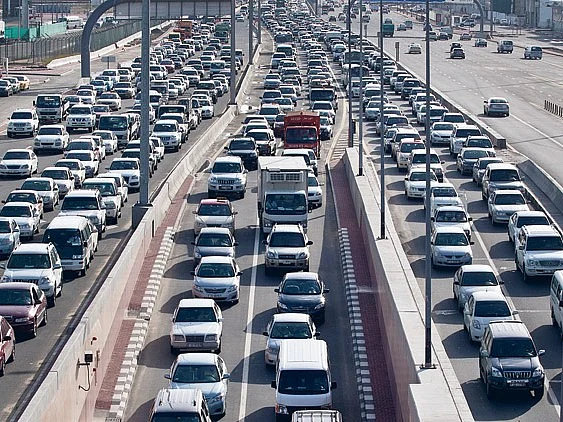Traffic congestion: UAE motorists grapple with stress and frustration
Nearly half of drivers report anxiety and anger in traffic jams

Dubai: For many motorists across the UAE, daily traffic congestion is not just an inconvenience, it is a significant source of stress, frustration, and anxiety, a new study reveals.
According to research conducted by RoadSafetyUAE and Al Wathba Insurance in June 2025, 86% of UAE drivers regularly experience traffic jams, with 80% noticing worsening congestion compared to last year.
This pervasive gridlock takes an emotional toll: nearly half (47%) of respondents say they feel frustrated, annoyed, very stressed, or anxious when stuck in traffic.
The study revealed that these negative feelings are especially common among women and younger drivers, highlighting how the daily commute affects different demographics in unique ways. While 29% say they have become indifferent or stay calm during jams, and 19% report boredom or restlessness, only a small 5% even say they enjoy the downtime.
Muralikrishnan Raman, Chief Financial Officer of Al Wathba Insurance, explained the motivation behind the research: “We want to give the concerned traffic participants a voice. We need to understand their feelings and perceptions with regards to the omni-present traffic congestion. As a customer-centric organisation, we are committed to improving our customers’ daily lives, which is why we teamed up with RoadSafetyUAE on this important project.”
Frustration
Stress and frustration on the roads also contribute to a worrying rise in aggressive driving behavior. The study found that 82% of motorists witness rude or aggressive behavior “very often” or “sometimes” when caught in traffic jams, a concerning trend linked to higher accident risks.
Thomas Edelmann, Founder and Managing Director of RoadSafetyUAE, noted: “Traffic congestion leads to high stress levels that can trigger misbehavior on the roads, increasing accident risks. It is crucial to raise awareness about polite and caring manners behind the wheel and find ways to reduce road dependency.”
Own cars
The study reveals that 92% of UAE residents rely on road transport daily, with 60% primarily using their own cars. More than half of these drivers (51%) travel alone, especially in Sharjah where 62% drive solo — a factor that likely worsens congestion there. Dubai, on the other hand, shows higher car occupancy with 43% of motorists carrying one or two passengers.
Experts say encouraging carpooling and alternative transport could help ease the emotional and physical burden of traffic congestion on UAE motorists.
Key Findings
47% feel frustrated, stressed, or anxious in traffic jams
29% are indifferent or calm during congestion
19% feel bored or restless
5% enjoy downtime in traffic
82% witness rude or aggressive behavior on roads
86% regularly experience traffic jams
80% see worsening congestion compared to last year
86% of respondents typically experience traffic congestion when on the roads
92% daily dependency on road transportation is extremely high
51% of motorists drive alone (no passengers)
How big is the problem
The study shows, that 86% of respondents state they typically experience traffic congestion. The highest values we see in Dubai with 91% and Sharjah with 90%.
Some 80% of respondents witness more traffic congestion this year than last year, with Dubai topping the list with 85%.
How do UAE road users feel when trapped in traffic?
Almost half of the respondents (47%) feel frustrated, annoyed, very stressed or anxious. These feelings are more pronounced with females and younger road users.
29% can deal with it, as they state to be indifferent and used to it, or they stay calm and relaxed.
19% state they feel bored or restless.
Interestingly, a small minority of 5% even enjoys the downtime during traffic jams.
The dependency on road transportation is very high, as 92% of respondents state they depend daily on it by utilizing their own car, bus, minibus or taxi services. Only 8% use transportation by metro or alternative means like eScooter, Bicycle, eBike).
Some 60% of respondents depend on daily transportation in their own car, which is the highest mention by far.
How to reduce vehicles on road
In order to reduce the number of vehicles on the roads, one opportunity is to gradually increase the number of people per car. It is interesting to note, that Dubai represents the highest number with 43% of motorists usually carry one or two passengers. It would be interesting to understand the reasons for this and how other Emirates and especially Sharjah can learn from it.
Sign up for the Daily Briefing
Get the latest news and updates straight to your inbox
Network Links
GN StoreDownload our app
© Al Nisr Publishing LLC 2025. All rights reserved.
